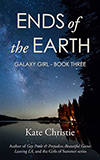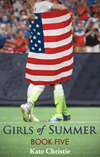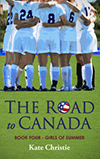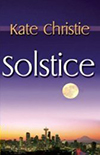When I began this post weeks ago, Paris hadn’t happened, Chicago hadn’t happened, WWU hadn’t happened, San Bernardino hadn’t happened. I started writing this post because while things in our family have been difficult recently, I am consciously trying not to let the difficulty outweigh the goodness Kris and the girls and I are fortunate enough to share on a daily basis.
But then all of these tragedies began cascading across the planet, some closer to my heart than others, and I stopped writing this post, unable to escape the guilty sense that I should be better able to handle my “first world problems.” Other people were facing terror, violence, and permanent loss, and here I was struggling with not enough sleep, with the chaos of parenting multiples, with my wife’s physical decline, with “having” to spend 35 hours a week at a good day job with excellent benefits instead of being able to write all day every day.

Peace for Paris by Jean Jullien
Driving our kids to lunch a couple of weeks ago, nearly in tears over the news of yet another mass shooting, Kris and I reminded each other how lucky we are: Our girls are healthy, we have a warm house and clothes, and we don’t have to worry about where our next meal will come from. As we sometimes joke, it pays to be disabled—assuming you’ve worked hard for a decade and a half like Kris did and paid into the system for every one of those fifteen years. Thanks to our Social Security safety net, the loss of Kris’s work income doesn’t mean we have to worry about losing our home. Our marriage is now recognized by the state and federal authorities, so as long as I have a job with good medical benefits, her medication is mostly covered. Which is huge for us—the current treatment costs $15,000 every six months, whether it’s effective or not.
And, unfortunately, the latest round isn’t much more effective than previous treatments. In the past two years, Kris has cycled through three “promising” treatments for her RA, and each has failed. That is the largest single reason I’ve found it more and more difficult to convince my brain that the good moments in our daily lives overshadow the less-than-good ones. Cortisol, the stress hormone, is partly to blame. Chronic illness can lead to chronic stress in both the affected person and family members. Stress in return adversely impacts learning and memory, immune function, and emotional resilience. I’m doing what I can to fight the crush of cortisol—physical activity, meditation, laughter, talk therapy, and acupuncture are all excellent methods to combat stress—but I am not always able to escape my body chemistry. Or the press of world events.
I’m not alone in that failure, obviously. Something Omid Safi, a columnist for the On Being project, wrote shortly after the Paris attacks resonated with me:
“The poem that I turned to was yet again from the amazing Somali-British poet, Warsan Shire:

later that night
i held an atlas in my lap
ran my fingers across the whole world
and whispered
where does it hurt?
it answered
everywhere
everywhere
everywhere.
“Everywhere, everywhere. Everybody hurts. It hurts everywhere.”
Later in the same post, Safi wrote, “In the afternoon I took my children out for a long, slow walk in the woods. We took time to reflect on the trees, the light, the fallen leaves. In the midst of grief, there is still time to hold a friend’s hand, to hold a beloved in the heart, and go for a gentle stroll.”
That is the impulse I felt when I began writing this post—to write about those moments in the woods, in the sunlight, when I held a loved one’s hand and we reflected on the beauty of the physical world many of us are fortunate enough to still be able to walk through, despite our individual and collective fear.
So here you go. Part one of my focus-on-the-good (or at least, try-to-distract-myself-from-the-bad) post.

Family outdoor time, circa 1975
When I was a kid, my parents would bundle my sister and me into the VW bus or, later, the Ford station wagon, and off we would go on summer camping and hiking adventures. These trips were often weeks-long, as my parents’ teaching/ education jobs came with definite vacation perks. From our central U.S. location we traveled far afield to explore the Northeast, the Southeast, the West, and even the Northwest, with the longest adventure of all a five-week road trip to Alaska the summer before I started eighth grade. Frankly, I can’t imagine five weeks confined in a Ford Escort wagon with two bickering teenagers, but I bow to my parents’ bravery, if not their wisdom.
The summer I turned nine, my dad invited me on an overnight backpacking trip in Great Smoky Mountain National Park. While my sister and mother visited my grandparents in Chattanooga, Tennessee, my dad and I packed up the station wagon and headed out on our own to Cades Cove, an isolated valley near the North Carolina border. Along the way we stopped at a rural gas station where I bought a green and white snapback with the picture of a fish and the words, “Gone fishin’!”
I truly wish I had a photo of my (tomboy) self in that trucker hat to share. Given that I barely took it off for the next year, I’m pretty sure there must be some photo evidence somewhere. But I was a kid pre-digital photography, so this backpacking gem from the following summer’s Wyoming adventure will have to suffice:

Dad & me in Grand Teton NP, 1981
When we reached Cades Cove, we set out along the Appalachian Trail. Our intended destination was an overnight shelter at Russell Field, not far from another shelter where my father had stayed the previous summer with a couple of teacher friends. The hike to the shelter was just over five miles, with an average elevation gain of 460 feet per mile. In other words, the trail was steep. And rocky. And I was still eight. Not a particularly large eight-year-old, either.

Russell Field Trail (PC: Brian Stansberry)
Since we’d driven in from Chattanooga that day, we didn’t get started until mid-day. By late afternoon along the heavily treed mountain trail, the light had started to fade. By then my father was carrying his pack and mine, both filled to the gills with dinner, breakfast, cooking supplies, sleeping bags, extra shoes, and clothes. We were climbing, climbing, and my dad was getting more and more nervous at the lack of signage on the trail. And then it began to rain. Not a hard rain, just a spattering of drops that managed to find their way through the heavy canopy above us.
My dad stopped walking. “It’s been a while since we saw a trail marker.”
I stopped, too. “Not that long.”
“I don’t know,” he said, looking up the trail and then back in the direction we had come. “It’s getting dark, and now it’s raining, too. If we’re lost, we need to go back. And if we’re going to turn back, we need to do it now.”
I shook my head. “No way. We don’t have to go back, Dad. We’re not lost. Let’s keep going. It can’t be far now.”
Years later he told me he would have turned back if not for me, and we very well might have become lost in the dark, rainy forest. But my confidence in his navigation skills gave him the push he needed to slog onward and upward, still carrying both of our packs. In a short time we were rewarded with an elusive white Appalachian Trail marker, and a little while after that we picked up the scent of wood smoke. We weren’t lost, after all. Around a bend and across a small field lay the Russell Field shelter.

Russell Field Shelter (PC: Brian Stansberry)
Soon we were ducking under a plastic sheet into the stone shelter that had three walls, a massive fireplace, and two rows of sleeping platforms. Three people were already in the shelter, thus the wood smoke scent. We hadn’t even introduced ourselves yet when one of the trio, a woman, turned away from the fire and said, “Wait, I know you.” I assumed she was talking to my father, but her eyes were on me as she said, “You’re Kate Christie, aren’t you?”
Floored does not describe the feeling adequately. We were on a remote mountain six hundred miles from Kalamazoo, and yet the people we ended up sharing the shelter with that night were not only from Kalamazoo, but one of them was a teacher in the Suzuki violin program I had joined a couple of years earlier. What are the odds, right? As an adult, I’ve had a few other coincidental encounters—running into a pair of former college classmates at a Tube station in North London, and seeing the same college friend in Midtown Manhattan twice in two different locations. But somehow, randomly stumbling across acquaintances in the middle of a busy city is less shocking than entering an Adirondack-style shelter in the middle of nowhere and discovering someone who knows your name.
The rest of the camping experience was uneventful, except that I was wearing overalls (and a snapback—I know, right?) and I didn’t quite manage to get the straps out of the way when I went outside that night by myself to pee in the woods. Suffice it to say, I stood with my back to the fire for longer than I might otherwise have done that night, glad for the darkness to hide my embarrassment. The next morning, we said goodbye to our fellow Kalamazooans and headed back down the trail to Cades Cove. By evening, we were in Chattanooga sharing stories of our adventure with the rest of the family, and my dad was shaking his head at the fact that he had been ready to quit and I was the one who insisted we keep going.
The thing is, I hadn’t known to be afraid. If I had had the knowledge he did, I might have agreed with his conservative assessment and we might never have made it to Russell Field. A year later, we were in Wyoming preparing to rappel down a rock face in Grand Teton National Park, and I came face to face with a portion of the fear he must have felt that day when it appeared he might have gotten lost in the Smoky Mountains with his eight-year-old daughter. Just before it was my turn to step backward into nothingness, I looked up at the Exum mountain guide who had taken us out for a day of family mountaineering, and I said, “The rope won’t break, right? I can’t die doing this, right?”

Me, about to step into nothingness
I was just looking for a little encouragement to allay my fear. But the guide, whose ten-year-old son was along as his assistant, looked me in the eye and said, “Well, sure it could break. The harness could fail or you could slip and fall. But it’s only twenty-five feet. You would be badly hurt, but you probably wouldn’t die.”
As I digested the guide’s less than reassuring answer, I stood frozen for what felt like an eternity while everyone encouraged me to step backward down the rock face. Finally I shook my head. “I can’t do it. I don’t want to rappel.”
The guide shrugged and untied me, unimpressed but also apparently unsurprised. Girls, I imagined he was thinking as he instructed his son to take me down the trail around the back of the rock face. Humiliated, I followed the mountain goat-like boy. And you know, I don’t think I’ve ever quite gotten over the shame of backing out of the culminating moment of our mountaineering lessons. My parents and even my older sister assured me they didn’t think any less of me, but I thought less of myself for giving in to fear.
That feeling of failure in the face of fear was not something that faded easily, either. Fifteen years later, now in my early twenties, I went on a river rafting trip with some friends to the New River Gorge in West Virginia. It was my first such trip, so I didn’t realize what three class V and five class IV rapids combined with a river running high at nine feet above normal meant. Not until we hit a giant hole in the first class V rapid sideways and the raft flipped and I ended up under it did I realize that river rafting was dangerous. Like, seriously, death-defyingly dangerous.

Fortunately, during the bus ride to the river the guides had told us what to do if we ended up under the raft. As soon as my life jacket sucked me to the surface, I turned my body over in the water so that I was face up with my feet pointing up to the sky (or where I assumed the sky was, anyway), and then I pulled myself along the bottom of the raft to the nearest edge. The raft was briefly stuck in the hole in the middle of the river being pummeled by the current, but I was lucky enough to pull myself out where I could be rescued with relative ease. It just so happened that a bunch of Ohio State football players—gag—were in the convoy behind us. I had barely popped out from under the raft when a giant dude lifted me out of the water by my life jacket and tossed me easily into the bottom of his boat.
My other raft-mates were similarly dispatched within a minute or two. We were saved—except that we still had the rest of the river run to complete: ten more miles of raging whitewater, including multiple class IV and V rapids.

Once the football players rescued us and the guides recovered our raft and guided it into an eddy, we gathered on shore to regroup. As the guides discussed the best strategy for the rest of the run, I was unable to focus on much other than the fear pulsing through my brain. I mean, I was UNDER the boat. I was under the BOAT, for f@$%’s sake. I shivered and my knee jumped spasmodically as I mentally rehearsed the words demanding to escape my lips: “No effing way am I getting back in that boat! I am walking back to the bus! Just point me at the road or trail, because I am out of here!”
During the brief pause between decision and declaration, I would like to say that I pictured the Exum guide shrugging at just another girl too scared to step backwards off a mountainside. But I didn’t. I sat there reliving the moment the raft flipped, stranding me under the surface of a river I had (I now realized) been foolish to challenge. The thing is, I’m not a strong swimmer. I don’t like to put my face underwater, like, at all. Inevitably, even in the relative safety of a swimming pool, I take a breath at the wrong moment and end up coughing chlorinated water and snot everywhere. The New River is about as far from the calm of a swimming pool as you can get. After being tossed into the “hole” in the middle of the river and then riding the crest back up and flying out of the upturned raft down, down into the river where the raft crashed on top of me, blocking out the sun—how would I, poor swimmer and generally water-wary woman that I am, ever find the courage to take up my rented paddle again?
Fortunately, though, I did pause, which gave the girl next to me—a friend of a friend whose name I don’t remember but whose shrill voice I can still hear—the chance to declare, tears welling in her eyes, “I can’t get back in that boat. I can’t do it! I won’t! I would rather walk back! You can’t make me get back in!”
The entire group looked at her, me included. Hearing my own fearful thoughts come out of her mouth and hang heavy in the warm air made me realize suddenly that I absolutely did not want to be that woman. I wanted to be strong and brave and courageous. And even if I wasn’t, I was damn well going to pretend to everyone else that I was. Chickening out wasn’t an option. The only option was to keep going and hope that everything would turn out all right.
Oh my effing god, I thought. I have to get back in the raft.

“It’ll be okay,” I said to the woman who was somehow even more scared than I was. “We’ll be okay.”
And we were. The guide company quickly reshuffled and gave us a new guide, someone who had been down the river more than twice (!), and a football coach added some weight and heft to our already underweight, under-heft boat. (As a Michigander, I can honestly say that that afternoon on the New River was the only time I’ve ever been happy to see anyone from the Ohio State football team.) I gritted my teeth and clamped down on the shriek of terror trying to work its way out of my mouth, and I tried not to let on how scared I was as we set off down the river. The experienced guide made the rest of the trip seem easy, and by the end we were all disappointed that the adventure was over. Except maybe the woman who had wanted to quit. She was supposed to stay overnight at the campground with the rest of us, but she and her sister got in their car and headed home to Michigan as soon as the bus dropped us off at the rafting company’s base.
That night around the campfire we were informed that the spot on the river where we flipped kills a couple of people every year. The hole we tipped into has a channel that has the potential to suck a person under and spit them out TWO MILES downriver. If I had known that at the time, it would have been like the Exum guide saying to me, “Yeah, you could totally die.” I’m not sure I would have gotten back in the boat, to be honest, even with my fellow chickenshit passenger’s example. But I didn’t know yet about the death trap we’d narrowly escaped, and so I got back in the raft and faced my fear, and everything really did turn out all right. My friends and I were minor celebrities that night—“Dudes, you totally could have died! Did you know your guide had only been down that section of the river TWICE before? It’s a miracle you survived!”—and we felt fully and completely alive the way you do only after facing down possible death and, yes, the deepest of fears.
This post is ridiculously long, so I am going to pause it here. The second part is its own separate post. But for now, I’ll leave you with an awesome video (with an even awesomer soundtrack) that will you give some idea of the conditions on the river the day my friends and I blithely set out on our little rafting adventure.























I loved reading this. Parts brought me to tears. I hope you won’t mind if I share the Warsen Shire words within my small Facebook world. They touched me in such a deep and emotional way. Merry Christmas to you, Kris and those beautiful girls.
Hi Sue. Thanks for the note. Share away. And hope the holiday season is good for you and yours–and that you get some snow! Happy holidays from Kris, me, and the girls.
May your daughters enjoy the same kind of adventurous spirit that you posess.
Thanks, Norma. Merry Christmas!